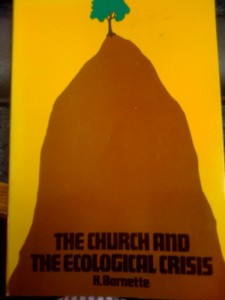 In 1972 Henlee H. Barnette was a professor at The Southern Baptist Theological Seminary. Barnette was also an avid opponent of biblical inerrancy and, it appears, of the conservative resurgence in the Southern Baptist Convention. However, in that year, Barnette released, The Church and The Ecological Crisis, as, by his own admission, “an attempt to summarize the salient factors in the eco-crisis in the light of the biblical understanding of man and nature.”
In 1972 Henlee H. Barnette was a professor at The Southern Baptist Theological Seminary. Barnette was also an avid opponent of biblical inerrancy and, it appears, of the conservative resurgence in the Southern Baptist Convention. However, in that year, Barnette released, The Church and The Ecological Crisis, as, by his own admission, “an attempt to summarize the salient factors in the eco-crisis in the light of the biblical understanding of man and nature.”
To be sure, not all that Barnette has to say is bad. For instance, his emphasis on pollution control and holistic gospel preaching is as timely today as it was when he first gave these lessons in the Norton Lectures at Southern Seminary, however, I found this book very telling of the reasons why a conservative resurgence was necessary in the SBC during the last quarter of the Twentieth Century.
In Barnette, we find, not a man dedicated first and foremost to biblical literacy and inerrancy and governed by the book, but a man governed by a liberal worldview that shaped his theology. Thus, seeing the “eco-crisis” that was faced in 1972 (and presumably today) Barnette advocates for population control through organizations such as Planned Parenthood. Arguing that we have a responsibility to love all creatures and nature, Barnette even goes so far as to suggest that “Christian agape” to fellow humans can be shown by allowing and potentially even enforcing abortion as a form of population control.
In any event, abortion is a sure method of controlling population growth. In Japan, for example, where birth control has been a national policy since 1949, there were 20 million legal abortions up to 1964. During this time the birthrate dropped from 34.3 in 1949 to 16.5. About 70 percent of the reduction is attributed to legalized abortions.
The liberal worldview and mindset of Barnette leads him to a documentary hypothesis view of the Old Testament and even to a belief echoed in Carl Sagan that nature is itself a sort of living being with a type of personality (Barnette loosely advocates panpsychism, which views the universe as a living organism).
Later in life, Barnette would be quoted in his passionate rejection of inerrancy,
Almost Every decade for the last 30 years, I have written an article on inerrancy as a biblical heresy…Southern Baptist fundamentalist inerrantists claim the Bible as inerrant as to text, history, science, and cosmology…We must discover the Word in the words of the Bible. To make the Bible perfect and to give our ultimate loyalty to it is to worship a thing adnd not a person, Jesus Christ. This is called bibliolatry, the worship of a book (Sutton, The Baptist Reformation, 419).
Barnette was not all wrong (though I believe history has proven that he is not all right either) on the environment and on the responsibility of Christians to be engaged in a holistic approach to the gospel. I believe that Southern Baptists would have done well to have been involved in social issues long ago. At the same time, the criticisim that SBC adherants have not been involved in social issues is not totally true either. It is just the case that issues like abortion, euthanasia, and disaster relief, which have always elicited great response from the Southern Baptist community are not “cool enough” to be considered social involvement anymore. Either way, Southern Baptists should have heard Barnette’s push toward holistic evangelism, however, it was Barnette’s retreat from orthodox and historical views of God’s word that caused his voice to fall on deaf ears for the marjority of Southern Baptists.
Instead of Barnette’s liberal approach that devalues the Word of God, evangelical Christians must embrace a holistic gospel that lifts high God’s word and engages in social activism primarily for his glory. My hope and prayer is that the Conservative Resurgence laid the groundwork for a rich theology of this type and that the GCR opens the door for this to be lived out as gospel driven change for our denomination and our world.

